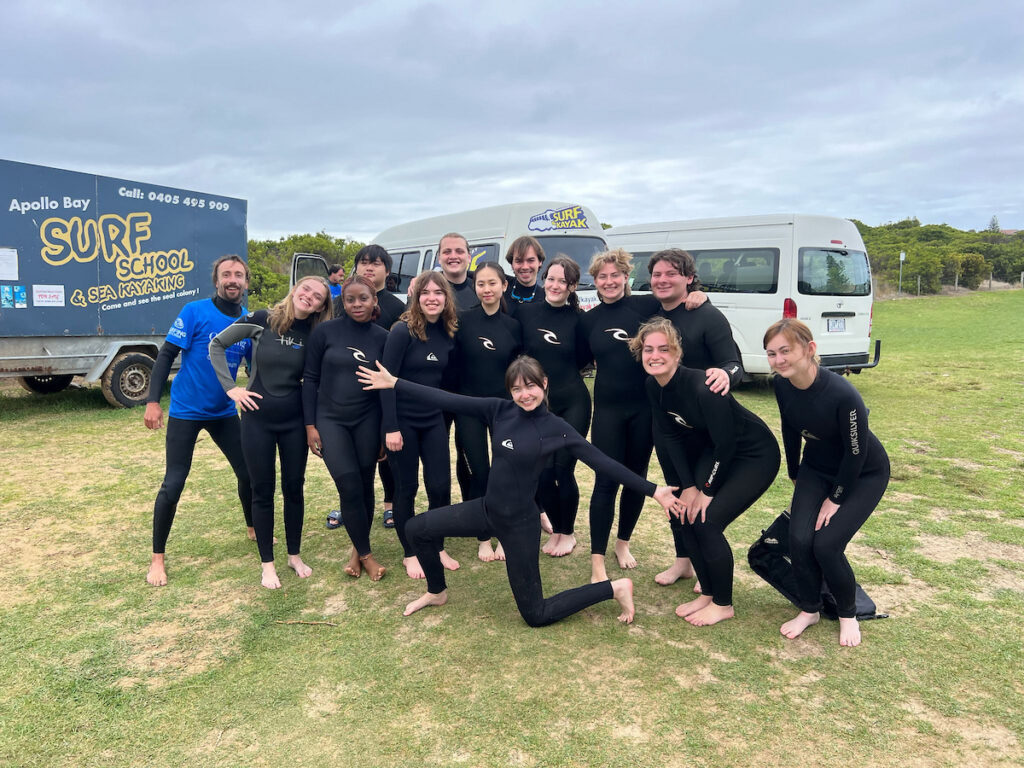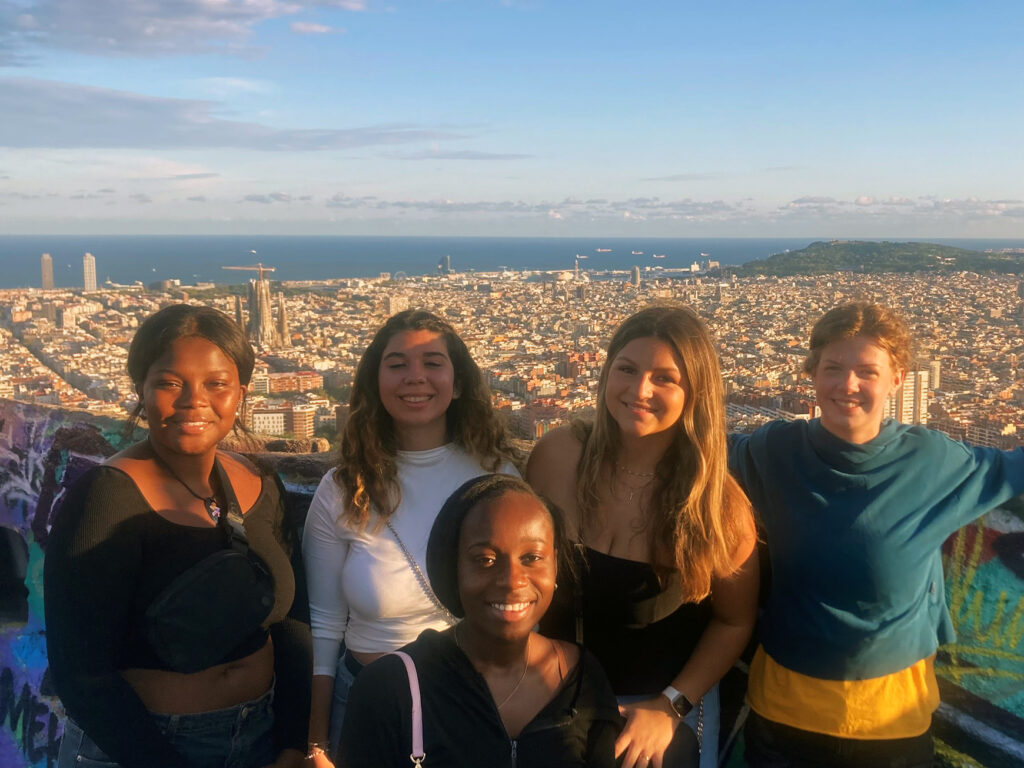Tips to Handle Culture Shock and Reverse Culture Shock When Studying Abroad


Studying abroad can be one of the most transformative, exciting, and rewarding experiences you can have as a college student. Regardless of your destination, your experiences in new places open your eyes to new cultures, help you grow as a person, and leave you with memories that will last a lifetime. Culture shock is a real, human reaction to these experiences, especially as you adjust to your life in a new country and readjust after you return home.
This guide explains what culture shock and reverse culture shock are, how to recognize them, and how they might affect you and your experience. You’ll also find tips to help you thrive, and find answers to commonly asked questions.
What is culture shock?
Culture shock is a feeling of confusion, homesickness, or frustration experienced when you’re immersed in a culture that is different from your own.
When you begin your study abroad experience, you’ll likely notice elements such as differences in language, food, customs, and small daily routines. At times, you might undergo periods of loneliness, overwhelm, or even irritation. It is important to remember that culture shock is completely normal, and part of your emotional adjustment process when studying abroad. You’ll notice that these feelings usually come and go after you adapt to your new surroundings and find your confidence.
The four stages of culture shock
Overcoming culture shock begins by recognizing it. Below are the stages you might begin to feel once started on your study abroad experience:
- Honeymoon: You’re excited, and everything feels new.
- Frustration: You begin noticing some differences that might feel hard to adjust to.
- Adjustment: You start to find your rhythm and you understand how things work.
- Adaptation: You feel confident, comfortable, and at home in your new culture.
Knowing the stages of culture shock can help you not only recognize but validate what you’re feeling. Remember, this is temporary, part of adapting, and a small part of your overall study abroad experience.
How do I adjust to culture shock?
- Be kind to yourself. Recognize that adjusting takes time, you cannot expect yourself to feel 100% comfortable and confident right away, give yourself time and, most importantly, grace.
- Stay curious. Approach your host culture with curiosity instead of judgment. Be sure to ask questions, listen, observe, and embrace learning.

First impressions, I learned, are not always as telling as we think. From my experience in Scotland, I also learned not to make hasty judgments or underestimate cultural differences.” – Julie R., IFSA University of St Andrews Partnership
3. Create a routine. It helps to establish small daily habits, such as a morning walk or run or a quiet journaling session to create stability in your new environment.
4. Build connections. Make a conscious effort to meet locals, join student groups, and connect with your fellow international students. Remember, you’re not alone!
5. Learn key phrases. Even learning just a few words in the local language can help you feel more connected and confident. This can help break the ice, show locals you’re trying, and make everyday interactions feel less intimidating. It can also help sharpen your language skills.
- Please/thank you
- Excuse me/I’m sorry
- Where is__?
- Do you speak English?
6. Take care of yourself. Eat well, get enough sleep, and stay active. Your physical health supports your emotional resilience, but it’s important to listen to your body and what it needs.
7. Stay balanced. Stay in touch with your loved ones back home, but don’t let it prevent you from engaging fully in your host culture. Balance is key.
What is reverse culture shock?
After months of adapting to life abroad, you might expect your return home to feel easy. But many students find that reentry has its own challenges.

“You left your normal life months ago and your world got flipped upside down, and a new reality became the norm. Reverse culture shock is a thing that almost every student who goes abroad experiences when returning home, and it is perfectly normal to experience.” – Tanner W., University of Adelaide in Adelaide
How do I adjust to reverse culture shock after studying abroad?
- Acknowledge growth. You’ve changed in meaningful ways. Be proud of that, even if it takes time to find your new “normal.”
- Share your stories. Talk about your experiences with friends and family, but be sure to also seek out people who understand, like other returning students, who might share the same feelings. Want to learn about other IFSA’s student’s experiences. Read their student stories.
“If you take what you’ve learned while abroad about trying new things and appreciating every opportunity and experience that comes your way and apply that to your life back home, then your transition will be so much easier.” –Kirsty R., University of Edinburgh Partnership
3. Stay connected to your host culture. Cook your favorite dish, listen to music, or keep in touch with friends you made abroad to keep your experiences closer..
4. Apply what you learned. Think about how your new skills and perspectives can enrich your life at home, in school, work, and in your relationships.
5. Practice patience. Reentry can feel like another adjustment period. Give yourself time to settle in.
6. Plan your next adventure. Having something to look forward to, even a small trip or getaway, can help channel your energy and foster your curiosity.

“In the end, it’s the little things that make up your experience abroad and even the things that seem negative in the moment end up being funny stories later on.” – Evalyn P., IFSA Barcelona Universities Program: UAB
For more helpful insights into navigating cultural adjustment, the U.S. Department of State has a helpful guide on cultural adjustment, which explains key stages of returning home and thriving after an international experience.
Culture shock and reverse culture shock FAQs for study abroad
- Can I prepare for culture shock before I leave?
A. Yes! You can prepare for culture shock by learning about your host country’s customs, following local or on social media, practicing basic language phrases, and mentally embracing the idea that differences are normal, and even exciting. Many students also find it helpful to connect with others who’ve studied there before.
I started following my university on Instagram. I watch their YouTube videos and regularly checked the clubs and society webpages. This made me feel a part of the student body before I arrived. I was even able to connect with some members of clubs I wanted to join on social media before I arrived. This can also reduce anxiety about the unknown.” – Chioma U., University of Leeds Partnership
2. How long does culture shock last when studying abroad?
A. Everyone’s timeline is different, but many students report that the most intense feelings of culture shock last a few weeks. With time and effort to adjust, most feel comfortable and confident within a month or two. Remember: the stages of adjustment are normal and part of your growth.
3. How do I explain my feelings of reverse culture shock to family and friends?
A. When you get home, it can be hard to describe why home feels strange after being abroad. It can help by explaining to loved ones that your perspective has changed and that you’re readjusting to a place that feels familiar but different at the same time. Sharing stories and reflecting on your experience can often help them understand what you’re feeling.
4. Will I ever feel completely “at home” again after studying abroad
A. Most students do eventually feel at home again, but often with both a new perspective and a deeper appreciation for their home and host cultures. It’s completely normal and human to carry a sense of longing for your host country while still feeling connected to home.
5. What should I do if culture shock or reverse culture shock continues to feel overwhelming?
A. If your feelings become intense or don’t improve with time, reach out for support. Talk to your program staff, advisor, or a counselor. Remember, you’re not alone, and getting help can make a big difference in how you adjust.
Start your journey
Whether you’re planning your study abroad experience, beginning your semester away, or returning home, know every emotion you feel is valid, and every emotion is part of your journey of growth. With patience, curiosity, and self-care, you can navigate culture shock and reverse culture shock with confidence.
” Studying abroad is all about gaining new perspectives and pushing yourself out of your comfort zone—and that doesn’t necessarily end when you get on the plane to fly home. [merge with below..]
By questioning the established norms of your home country and looking at it through fresh eyes, you’ll continue to become a smarter and more confident global citizen. And really, that’s what studying abroad is all about.” IFSA student Studying Abroad in Australia.
For more tips on preparing for your time abroad, packing smart, or making the most of your experience, check out our Study Abroad Guide, or get in touch with us.